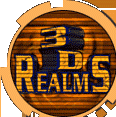The Apogee Legacy #21 - Darren Baker
 In 1995, Apogee Software released the first title under our new branded label concept. That was Terminal Velocity under the "3D Realms" brand. This concept was used a second time in 1998, when we released "Balls of Steel" under the "Pinball Wizards" label. As with the "3D Realms" branding idea, the Pinball Wizards one was to launch a series of pinball related titles. However, to date Balls of Steel was the only title put out under the Pinball Wizards brand.
In 1995, Apogee Software released the first title under our new branded label concept. That was Terminal Velocity under the "3D Realms" brand. This concept was used a second time in 1998, when we released "Balls of Steel" under the "Pinball Wizards" label. As with the "3D Realms" branding idea, the Pinball Wizards one was to launch a series of pinball related titles. However, to date Balls of Steel was the only title put out under the Pinball Wizards brand.
One of the driving forces behind the Balls of Steel title was Darren Baker. Darren Baker was actually involved with two other titles with us before Balls of Steel in 1998. Those titles were Halloween Harry/Alien Carnage as well as Mystic Towers (both in 1994). So Darren has been involved with us for several years now.
Darren, mostly due to his location (Australia), has one of the more unique relationships with us. Despite having worked on three seperate titles with us, has never met us face to face. It's one of the more unique aspects of our company, having developers all over the world. Let's get to his interview:
Past Pioneers of the Shareware Revolution
Issue #21 - Darren Baker
1) How did you first come in contact with Apogee?
I came into direct contact with Apogee in 1993 (I was 18) through a group of guys here in Brisbane who were developing a very cool (256 color parallax scrolling!!) game called Halloween Harry. I managed to get onto the team and contributed the digital sound engine. My brother Steven also composed a good deal of the music for the game.
Harry was picked up for Australian distribution by Manaccom, who then lined up US distribution through Apogee.
We had heard of Apogee prior to all this of course, particularly with the Commander Keen and Wolfenstein games, so to be associated with them was very exciting.
The Harry project then led to Mystic Towers (with another team on which I was the PC programmer), then eventually to Balls of Steel, as Wildfire Studios.
So basically Apogee published the first 3 commercial games I worked on.

|
| Darren Baker at his desk with Fidelio - Feb 2006 |
2) Was there a reason you decided to work with Apogee, say versus going on your own or working with another company?
I guess the initial reason was that we had the contacts with Apogee, and Scott and George were willing to support and take chances on inexperienced - albeit talented - teams, and overseas ones to boot.
As for going on your own, other people I knew had tried the "do everything" route (eg one or two people doing code, art, sound, manuals, packing, duplication, distribution!), and invariably the efforts were less than rewarding financially. At the time, getting products marketed and distributed properly was not something we properly understood or were even really interested in. We were far more concerned with the challenge of developing the games themselves, and when a successful company like Apogee offers you advances to get on and do what you enjoy, how good is that?! :)
3) Looking back, was there anything Apogee could have done better, regarding the marketing and distribution of your game?
I think Apogee did a great job with Balls of Steel. I think sales suffered a bit because the game's promotion led the ship date too far (or the ship date trailed the promotion, depending how you look at it!) That wasn't entirely their fault... ;)
4) Do you think your game was made better or worse by working with Apogee?
I have no doubt the final product was better for Apogee's involvement.
Balls of Steel took a somewhat different direction than we had originally intended for it once Apogee came on board. Originally it was to be more of a true-to-life pinball simulator, but a mixture of Apogee's influence, a need to better our competitors, and good ol' feature creep led it to be more of a hybrid sim / action game. Of course the most obvious Apogee influence is the Duke Nukem table, but the overall 'hardcore' feel probably owes a fair bit to them too.
5) Apogee had a policy of letting the designer or studio retain full intellectual property rights to their game. Nowadays, it's rare to find a publisher who allows this, especially if the publisher is providing the funding. Do you believe that it's best for the creator to retain IP rights? Why or why not?
Yes, it's best from the creator's point of view to retain the IP rights. But it's also best from the publisher's point of view that the publisher get the IP rights in exchange for the funding. Both can be reasonable points of view depending on the money involved and other specifics of the deal.
I certainly believe that developers should relinquish/sell their IP very reluctantly and only after much consideration. They need to negotiate to keep whatever they can.

|
| Final Balls of Steel Box Art |
5a) And if applicable, have you benefited from retaining ownership of your own IP?
Yes, definitely. After Balls of Steel we reused our pinball engine technology to develop half a dozen more pinball games and licensed it out to other developers.
More recently, a key part of our business in the casual games market is to retain ownership of our brand and carefully control territory and platform distribution rights. This allows us to reuse and license our technology, create sequels and spinoff games, and control revenue streams from online and worldwide retail channels. This strategy has paid off for our hit game Tumblebugs, for instance.
5b) Do you think there'll ever be a sequel to your game(s)?
The idea has been kicked around on and off. Apogee actually owns the trademark for Balls of Steel (see, Scott's not *completely* silly and giving away IP rights all over the place :)) but we're pretty free to do another game, which is great.
We'd really like to do a Balls of Steel 2... maybe with a Duke Nukem Forever table.. yeah, that would be cool.
In the PC market pinball tends to be a budget title genre though, but I'd want something much better than that. I think it'd be a great fit for the PSP.
6) Is there any story/incident that stands out as interesting during your time associated with Apogee?
What's odd is that such stories are quite hard to come up with, because I've never actually met *any* of the Apogee folks. Not one. We've only ever swapped emails, and had the occasional phone call. The upside is I still have something to look forward to!
However, one thing I do distinctly remember is when Scott offered us the Duke Nukem 3D license to include in Balls of Steel.
We hadn't seen the game, and to be honest, we didn't think a whole lot of the first two Duke games (sorry Todd et al!), so we were sceptical to say the least. And it didn't help a whole lot either when were sent nothing but a CD full of raw Duke graphics like static cutouts of pig cops and loads of various gibs :) What's more, we were also going to have to scrap a whole lot of work we'd done on the Devil's Island table to make room for it.
I do remember Scott insisting that the game was definitely going to be a hit, but still, pigs with guns ... riiight...
Anyhow we eventually got a build of the game, and that's when the 'maybe' rapidly became 'yes please'!
(Besides, it was only fair - they put a Balls of Steel pinball table in Duke :))
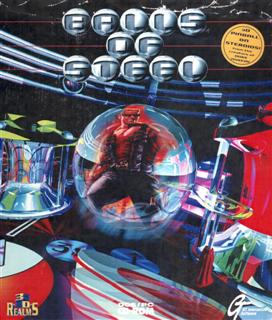
|
| Pre-Pinball Wizards unused Balls of Steel Box Art |
7) Apogee was an early pioneer in terms of teaming up with external designers and studios, and continues to do so even to this day (currently working with Human Head Studios on Prey). Why is it that so few other studios do this (mentor and fund outside projects with lesser known teams)?
I'd guess the perceived risk is the big factor, but I think it's actually a smart business move if you can manage a nascent external team and provide the missing ingredients (funding, marketing, business, management, QA etc) and harness their idealism and creativity.
I have asked myself over the years whether I'd do for another team today what Apogee did for us back then, and I'd like to think I would. One difference is I'd want to do more due diligence and manage the teams a lot more closely ('from the inside') rather than just hope that they kept delivering milestones from time to time and didn't drop the ball! It took us over 2 years to ship Balls of Steel, and while I don't think Apogee was overly sweating the advances, it was definitely a long time to be on a project.
8) What the biggest difference in the industry nowadays versus when you worked with Apogee?
In some ways that question's quite difficult for me to answer, because I think I have learned and changed so much over that time that it can be tough to compare objectively.
I was going to say that were we starting out now, we would have a much harder time getting a deal, and that there'd be no Apogees out there to give us a break. But with the booming casual games industry over the last couple of years, the window has once again opened for small developers to get games to market, so that's not really true.
There is of course the usual observations that the budgets are bigger, the teams are huge, that most games are based on licences, etc.
9) What have you been doing since your time with Apogee?
For the most part I've been CEO and Technical Director of Wildfire Studios. I worked as a programmer for a short while in London a few years ago for another developer, and that was an excellent experience. I'm really enjoying the success Wildfire is having, and it's interesting moving my focus from programming, which has always been my passion, to the business to ensure we sustain and grow.
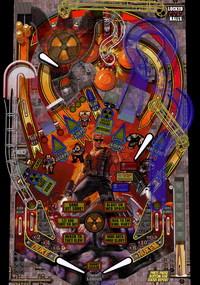
|
| The Duke Nukem table from Balls of Steel |
10) If you're no longer making games, have you thought about returning to this industry? If not, why not?
Heh, I've thought about *leaving* the industry from time to time, but there's nothing I can think of doing that requires such a blend of technical, creative and business skills. It's very stimulating. :)
11) Looking back, are there any missed opportunities that you wish you'd have jumped on?
Yes, quite a few. I think we could have exploited the success (critical if not commercial) of Balls of Steel in various ways, but didn't have the perception and know-how to do it. That said, we haven't done too badly at all, but we could have been smarter and focused on the right things. But overall I regard the early days (including our time with Apogee) as an excellent apprenticeship in the industry.
12) Other than your game(s), what's your favorite game released or produced by Apogee (or 3D Realms)?
Duke 3D was my favourite, that sucked down (so to speak!) way too much of my time. The network play was awesome.
12a) And what's your favorite 2-4 games released by anyone else?
I think the Infocom games (Zork etc) are some of the best of all time.
In more recent years I thought the original Unreal was excellent.
These days I don't play games for entertainment anywhere near as much as I used to, now my interest is more of an analytical one.
13) Is there anything else you'd like to add about your time here or to fans of your title(s)?
I would like to thank Scott, George, Joe and the rest of the Apogee crew that we worked with over the years. They were instrumental in getting us started in the industry, and great to work with. I still keep tabs on what Apogee/3D Realms is up to, and listen closely to what Scott has to say about the business of games.
As to our fans - stay tuned. We've got some great new games on the way!
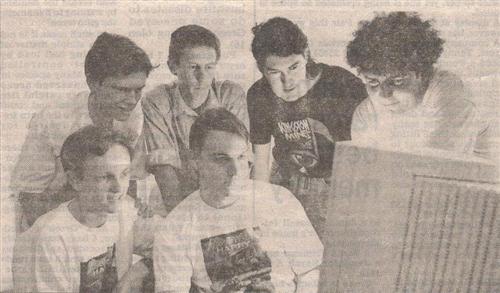
The Alien Carnage team from a newspaper scan in 1994.
Top Row (L-R): Darren Baker, Tony Ball, John Passfield, Steve Stamatiadis
Bottom Row (L-R): Steven Baker, Robert Crane
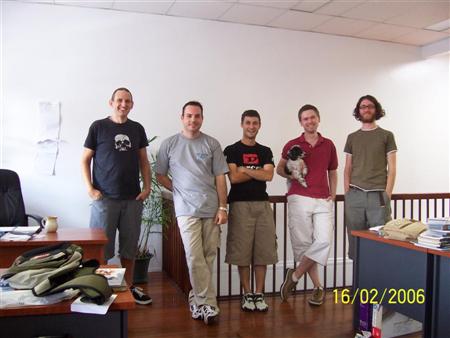
Wildfire 2006:
L-R: Adrian Cook, Robert Crane, Robert Gilchrist, Darren Baker, Leon McBride
As was said above, Darren has been involved with three seperate titles with us. We have plenty of information available on them on our website, please use the links below:
- Our Balls of Steel Catalog Page
- Our Alien Carnage Catalog Page
- Our Mystic Towers Catalog Page
- Mystic Towers Page on Wikipedia
- Balls of Steel Page on Wikipedia
- Wildfire Homepage
Make sure and tune in again next Monday morning, when we bring you the next in our Legacy Interview series. The series is close to being finished, we have two more interviews planned, plus a wrap up edition. The last couple will be special issues, so you're going to want to tune in for those.
Posted by Joe Siegler on June 5, 2006 at 2:02 PM | Permalink
| Discuss this story on our forums
News Categories: About 3DR / 3DR Staff | The Apogee Legacy
